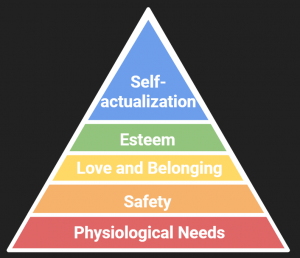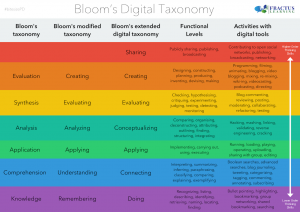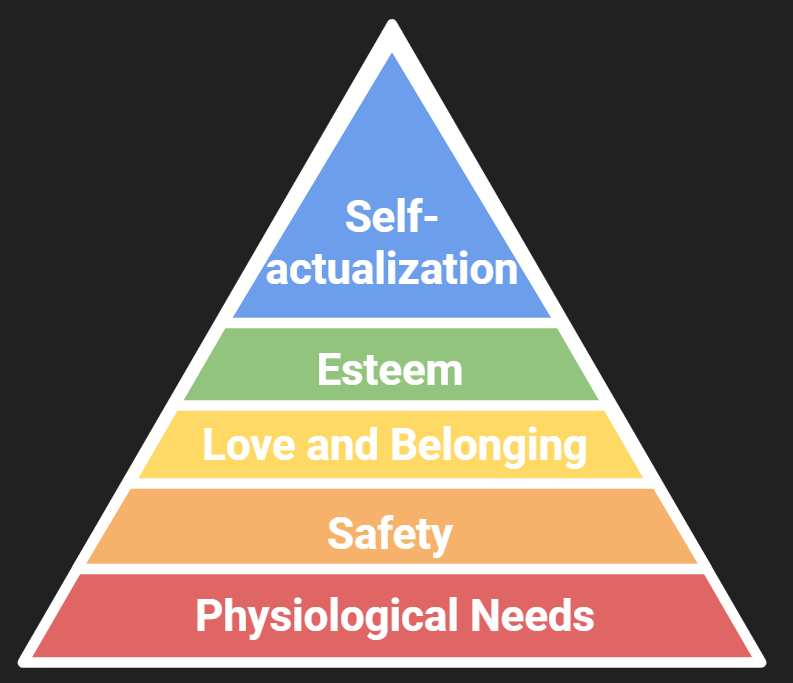Educators have a tough job right now. We’ve been told by Superintendent Hoffman to “continue to provide educational opportunities to students to the best of [our] ability” during this time of school closure and world-wide pandemic. We’re doing our best to do that. But we know in our gut (if not in our knowledge of human psychology) that before kids can ‘do school,’ they must have their basic needs met first.
 I’ve heard it said, “Maslow before Bloom.” And this couldn’t be more pertinent right now. Maslow’s famous “Hierarchy of Needs” tells us that the primary human need is physiological. Necessities like food, water, and shelter must come first. Once these needs are fulfilled, people become very motivated to secure safety—financial security, getting or maintaining a job, health and well-being, safety against illness or accidents, etc. These first two levels are called “basic needs.” Only after our basic needs are met can we even begin to think about moving on to the next level, which is love and belonging. This is when cultivating relationships becomes a high priority. After that comes the need for esteem (a sense of self-worth). And finally, the pinnacle of human motivation—self-actualization. This is the point when humans want to develop our talents, engage in meaningful work, and fulfill our potential.
I’ve heard it said, “Maslow before Bloom.” And this couldn’t be more pertinent right now. Maslow’s famous “Hierarchy of Needs” tells us that the primary human need is physiological. Necessities like food, water, and shelter must come first. Once these needs are fulfilled, people become very motivated to secure safety—financial security, getting or maintaining a job, health and well-being, safety against illness or accidents, etc. These first two levels are called “basic needs.” Only after our basic needs are met can we even begin to think about moving on to the next level, which is love and belonging. This is when cultivating relationships becomes a high priority. After that comes the need for esteem (a sense of self-worth). And finally, the pinnacle of human motivation—self-actualization. This is the point when humans want to develop our talents, engage in meaningful work, and fulfill our potential.
Now when we think of our jobs as e ducators, we typically start from somewhere between the “Love and Belonging” level and the “Self-actualization” level. We rely on social and economic safety nets to make sure kids have adequate housing and food. And since Title 1 schools provide free breakfast and lunch, teachers don’t typically have to worry about kids’ basic needs. We assume that they walk into our classrooms having eaten breakfast, slept the night before, and (hopefully) been hugged and told “I love you” by their parent. This expectation allows the school to step in and help the children move into self-actualization. We do this with Bloom’s Taxonomy. When kids are at the pinnacle of Maslow’s pyramid, high-level academic growth occurs. This is when those high-DOK lesson plans with observable verbs like, “apply, analyze, create, and evaluate” are so effective.
ducators, we typically start from somewhere between the “Love and Belonging” level and the “Self-actualization” level. We rely on social and economic safety nets to make sure kids have adequate housing and food. And since Title 1 schools provide free breakfast and lunch, teachers don’t typically have to worry about kids’ basic needs. We assume that they walk into our classrooms having eaten breakfast, slept the night before, and (hopefully) been hugged and told “I love you” by their parent. This expectation allows the school to step in and help the children move into self-actualization. We do this with Bloom’s Taxonomy. When kids are at the pinnacle of Maslow’s pyramid, high-level academic growth occurs. This is when those high-DOK lesson plans with observable verbs like, “apply, analyze, create, and evaluate” are so effective.
So, where does that leave us now? Even under pre-pandemic conditions, there was no guarantee that kids came to school with their basic needs met. And now that the world as we knew it no longer exists, a lot more families do not have their basic needs met. How then, can we ‘do school’ (re: expect our kids to be at the top of Maslow’s pyramid) when we know that many of their parents are facing the worst crisis of their lives?
I’ve been grappling with this question for a few weeks now. I can’t claim to know the answer. But here’s my best shot:
Can we, as caring and insightful educators, recognize a child’s level on Maslow’s pyramid? Can we recognize a parent’s level? Can we support them, help them, offer resources, listen nonjudgmentally, and encourage them no matter which level they’re at right now? If we can do that, that’s enough. A bonus would be if we can help them move one level up from where they started this morning. If we can do that, we’re not only providing educational opportunities to the best of our ability, we’re helping them reach their best ability as well.
Sources:
https://www.azed.gov/communications/category/press-releases/
https://www.fractuslearning.com/blooms-taxonomy-digital-print-table/










Comments 3
I really enjoyed this Randi! These are such important reminders about meeting kids where they are for learning right now–and how doing that appropriately that really IS what they need. Developmentally appropriate instruction in the COVID-19 world will feel very different for educators, no doubt. But we would being doing a disservice to kids (and their families) if we tried to continue business as usual without acknowledging the earthquake these kids are feeling in their Maslow’s pyramid.
This is exactly what I needed today before I start my first class of the week. I am trying to keep our content light with short, high-interest texts that review concepts we covered this year. I don’t want to stress my kids out with something totally new when I am not sure their basic needs are being met. Thank you for this post!
This is great, Randi!
I agree wholeheartedly. Making sure students are physically and emotionally well comes before any learning that can take place. I take pride in incorporating SEL strategies in physical education. https://blog.shapeamerica.org/2019/11/how-to-integrate-social-and-emotional-learning-in-pe/
When meeting those needs, all other standards come easier. The teacher-student relationship was established.
Great work!